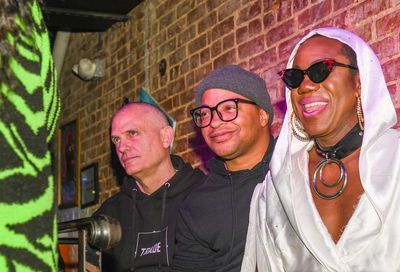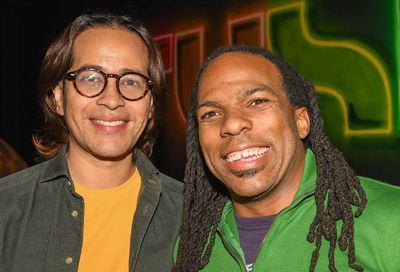Human Rights Watch Decries Condom Confiscation
New report charges police in four cities with using condoms as evidence of prostitution, countering anti-HIV efforts
The international human rights organization Human Rights Watch released a report July 19 that claims police in New York, Los Angeles, San Francisco and Washington are confiscating condoms from women suspected of engaging in sex work, undermining efforts to reduce HIV infections.
The 112-page report, ”Sex Workers at Risk,” documents how police and prosecutors use condoms to support prostitution charges. The report comes three days before the opening session of the XIX International AIDS Conference, aka AIDS 2012, in D.C., where about 25,000 delegates from around the world are expected to share research, best practices and policy solutions aimed at combating HIV/AIDS.
HRW assembled a panel of experts for a news conference announcing the report’s findings featuring local transgender activist Ruby Corado, founder of Casa Ruby; Sonia Rastogi of the U.S. Positive Women’s Network; Megan McLemore, a researcher with Human Rights Watch; Bamby Salcedo, project coordinator of HIV Prevention Services at Children’s Hospital Los Angeles; and Andrea Ritchie, a police misconduct attorney and organizer in New York who co-coordinates Streetwise and Safe (SAS), an initiative working with LGBT youth of color who experience criminalization.
McLemore told reporters that researchers involved in creating the report were consistently asked by sex workers for the number of condoms a person could legally carry, as many told the researchers they feared – or had experienced – police harassment or arrest on prostitution charges if they were found to be carrying condoms.
”This practice is a violation of human rights,” McLemore said of police and district attorney practices that use condoms as evidence of intent to engage in prostitution. ”Every person, including sex workers, has a right to protect their health. Every person, including sex workers, has a right to life.”
In D.C., McLemore noted that the report found evidence of the practice in six of the city’s seven police districts, particularly targeting women of color and transgender women. McLemore said that when HRW researchers spoke to members of the Washington Metropolitan Police Department (MPD), MPD personnel indicated that they were concerned about the possibility of discouraging condom use, but also defended the practice as a way to gain evidence.
McLemore said MPD personnel told her that prosecutions are not based solely on the possession of condoms, but are based on a ”larger picture” showing intent to engage in prostitution.
A request for comment from MPD was not immediately returned, though Councilmember David Catania (I-At Large), chair of the City Council’s Health Committee and a longtime leader in the District’s fight against HIV/AIDS, mentioned the matter during WAMU’s July 20 broadcast of The Politics Hour with Kojo Nnamdi.
”That’s not true here,” Catania said, responding to mention of possession of condoms being used as evidence of sex work in New York. ”[MPD] Assistant Chief Peter Newsham will tell you that that’s like an urban myth, the three-condom rule that you are somehow harassed. … [In] our conversation at D.C. courts, there’s not been a single documented case of condoms being used as evidence of prostitution in recent years. Not one.”
Many of the speakers at Thursday’s release argued it would be possible to strike a balance between police efforts to curb prostitution and essentially criminalizing condom use. They cited progress made in relation to how police deal with clean-needle exchanges, which exist in all four cities profiled in the report, as evidence that such a balance can be achieved.
The speakers also called upon policymakers at state and local levels to adopt legislation that would prohibit the possession of condoms alone from being used as evidence to prosecute suspected sex workers.
While the report focused on four cities, McLemore said she has received anecdotal evidence that similar procedures were occurring in Durham, N.C., leading her to say she believes condom confiscation is widespread.
Rastogi said the issue could also be viewed in the larger context of a ”war on women.”
”I think it goes back to a historical look at government bodies or police enforcement controlling women’s bodies, and law enforcement being one mechanism to be able to do that,” Rastogi later told Metro Weekly. ”And, unfortunately, it does impact the poorest communities of colors and those who engage in sex work.”
Corado and Salcedo, both Latina transgender women, noted that the problem has extended beyond sex workers to include transgender women who have been targeted by police because they are profiled and suspected to be engaging in survival sex work. Corado said politicians, particularly some councilmembers in D.C., want to ignore the larger issue of condom confiscation by police because addressing it would require them to invest in more resources aimed at solving the problem, such as providing training to police officers.
Support Metro Weekly’s Journalism
These are challenging times for news organizations. And yet it’s crucial we stay active and provide vital resources and information to both our local readers and the world. So won’t you please take a moment and consider supporting Metro Weekly with a membership? For as little as $5 a month, you can help ensure Metro Weekly magazine and MetroWeekly.com remain free, viable resources as we provide the best, most diverse, culturally-resonant LGBTQ coverage in both the D.C. region and around the world. Memberships come with exclusive perks and discounts, your own personal digital delivery of each week’s magazine (and an archive), access to our Member's Lounge when it launches this fall, and exclusive members-only items like Metro Weekly Membership Mugs and Tote Bags! Check out all our membership levels here and please join us today!


























